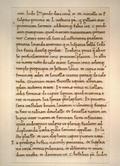University of Colorado, Boulder Leaf 39
This leaf comes from a rare manuscript of Livy's History of Rome (completed in about 9 A.D.) copied in Italy in the middle of the fifteenth century. It measures 22.5 x 16 cm and its vellum is very well prepared, though some rubbing of the ink has cast a shadow over the text block of some pages. The Humanistic script is crisp, clear, and without adornment; an exception is the Denison leaf, with its striking initial "H." See Denison University Leaf 39 for more information about this manuscript.
Text: This leaf contains the text of Livy's History, Book 27, Chapters 10-11. A scan of the recto is not currently available. The English translation is that of Cyrus Edmonds (1850), via Project Gutenberg.
Reconstruction Note! In Ege's original manuscript, this leaf followed what is now Leaf 39 in the Kenyon College portfolio.
 Boulder Leaf 39 Verso
Boulder Leaf 39 Verso
University of Colorado, Boulder Leaf 39 Verso
 Boulder Leaf 39 Verso Transcription
Boulder Leaf 39 Verso Transcription
auri. inde quingena pondo data consulibus et M. Marcello et P. Sulpicio proconsulibus et L. Ueturio praetori qui Galliam prouinciam erat sortitus, additumque Fabio consuli centum pondo auri praecipuum quod in arcem Tarentinam portaretur; cetero auro usi sunt ad uestimenta praesenti pecunia locanda exercitui qui in Hispania bellum secunda sua fama ducisque gerebat. [11.] Prodigia quoque priusquam ab urbe consules proficiscerentur procurari placuit. in Albano monte tacta de caelo erant signum Iouis arborque templo propinqua, et Ostiae lacus, et Capuae murus Fortunaeque aedis, et Sinuessae murus portaque. haec de caelo tacta: cruentam etiam fluxisse aquam Albanam quidam auctores erant, et Romae intus in cella aedis Fortis Fortunae de capite signum quod in corona erat in manum sponte sua prolapsum. et Priuerni satis constabat bouem locutum uolturiumque frequenti foro in tabernam deuolasse, et Sinuessae natum ambiguo inter marem ac feminam sexu infantem, quos androgynos uolgus, ut pleraque, faciliore ad duplicanda uerba Graeco sermone appellat, et lacte pluuisse et cum elephanti capite puerum natum. ea prodigia hostiis maioribus procurata, et supplicatio circa omnia puluinaria, obsecratio in unum diem indicta; et decretum ut C. Hostilius praetor ludos.
 Boulder Leaf 39 Verso Translation
Boulder Leaf 39 Verso Translation
...as many as four thousand pounds of gold, from which five hundred pounds each were given to the consuls, to Marcus Marcellus and Publius Sulpicius, proconsuls, and Lucius Veturius, the praetor, who had by lot obtained Gaul as his province; and in addition, one hundred pounds of gold were given to the consul Fabius, as an extraordinary grant to be carried into the citadel of Tarentum. The rest they employed in contracts, for ready money, for clothing for the army which was carrying on the war in Spain, to their own and their general glory. [11.] It was resolved also, that the prodigies should be expiated before the consuls set out from the city. In the Alban mount, the statue of Jupiter and a tree near the temple were struck by lightning; at Ostia, a grove; at Capua, a wall and the temple of Fortune; at Sinuessa, a wall and a gate. Some also asserted, that water at Alba had flowed tinged with blood. That at Rome, within the cell of Fors Fortuna, an image, which was in the crown of the goddess, had fallen spontaneously from her head into her hands. At Privernum, it was satisfactorily established that an ox spoke, and that a vulture flew down into a shop, while the forum was crowded. And that a child was born at Sinuessa, of ambiguous sex, between a male and female, such as are commonly called Androgynes, a term derived from the Greek language, which is better adapted, as for most other purposes, so for the composition of words; also that it rained milk, and that a boy was born with the head of an elephant. These prodigies were then expiated with victims of the larger kind, and a supplication at every shrine and an offering up of prayers, was proclaimed for one day. It was also decreed, that Caius Hostilius, the praetor, should vow and perform the games...